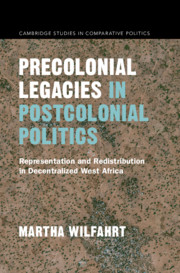 Precolonial Legacies in Postcolonial Politics
Precolonial Legacies in Postcolonial Politics Book contents
- Precolonial Legacies in Postcolonial Politics
- Cambridge Studies in Comparative Politics
- Precolonial Legacies in Postcolonial Politics
- Copyright page
- Contents
- Figures
- Tables
- Acknowledgments
- Introduction
- 1 A Theory of Institutional Congruence
- 2 Bringing Old States Back In
- 3 The Politics of Decentralization in Senegal
- 4 Political Narratives across Rural Senegal
- 5 Delivering Schools and Clinics in Rural Senegal
- 6 Congruence and Incongruence in Action
- 7 Decompressing Legacies of Public Goods Delivery, 1880–2012
- 8 Institutional Congruence beyond Senegal
- Conclusion
- Appendix
- Bibliography
- Index
- Cambridge Studies in Comparative Politics
8 - Institutional Congruence beyond Senegal
- Precolonial Legacies in Postcolonial Politics
- Cambridge Studies in Comparative Politics
- Precolonial Legacies in Postcolonial Politics
- Copyright page
- Contents
- Figures
- Tables
- Acknowledgments
- Introduction
- 1 A Theory of Institutional Congruence
- 2 Bringing Old States Back In
- 3 The Politics of Decentralization in Senegal
- 4 Political Narratives across Rural Senegal
- 5 Delivering Schools and Clinics in Rural Senegal
- 6 Congruence and Incongruence in Action
- 7 Decompressing Legacies of Public Goods Delivery, 1880–2012
- 8 Institutional Congruence beyond Senegal
- Conclusion
- Appendix
- Bibliography
- Index
- Cambridge Studies in Comparative Politics
Summary
In the final empirical chapter, I push beyond Senegal to look broadly across West Africa to assess the generalizability of my findings. Senegal is not the only West African state to display remarkable subnational variation in exposure to precolonial statehood nor to have recently undertaken decentralization reforms. I extend my coding of precolonial kingdoms to the subregion and match it to data from the Demographic and Health Surveys (DHS) and the Afrobarometer public opinion surveys to test the theory's generalizability. I find that areas of West Africa that were exposed to precolonial states have seen bigger gains in locally delivered public goods and that Afrobarometer respondents in these areas are more positive about their local governments and democratic practice than their counterparts in historically acephalous zones. While my theory is built around the specific legacies of precolonial statehood, the chapter's second half move beyond Africa to show the broader analytic leverage of the theory’s twin mechanisms of shared social identification and social network ties for Comparative Politics. The chapter concludes with a discussion of scope conditions for the argument.
- Type
- Chapter
- Information
- Precolonial Legacies in Postcolonial PoliticsRepresentation and Redistribution in Decentralized West Africa, pp. 218 - 243Publisher: Cambridge University PressPrint publication year: 2021


